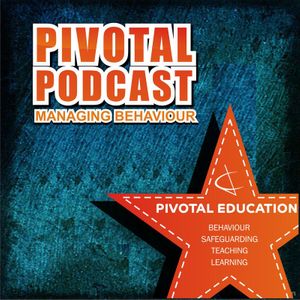Two dates, a dentist and a boat – PP108
Pivotal Podcast - Un pódcast de Pivotal Education

Categorías:
Paul shares some details about Pivotal Curriculum instructor courses across the globe. The next UK Open Pivotal Curriculum courses are on 12th and 13th July 2016 in Watford. Contact [email protected] for more details. James Mannion returns to the podcast this week to answer a voice mail question from Danielle about teachers as researchers. She is currently doing a Masters in Educational Practice and has to make an intervention – a ‘small change’ – and wanted to know what James thinks about how small this should be. Also, Danielle was interested in advice on reading research. James responded by answering the second answer first. He says that one way of approaching research writing is to use the ‘say what you are going to say, then say it, then say what you’ve said’ approach. So if you read the abstract, the introductory paragraph and the final paragraph, then you will glean 80% of the value of the article. If you want to delve into how the findings were created and the methodology then you can read the whole article but if you want to get through as many articles as you can to see what’s out there, then topping and tailing an article can be helpful. On how small an intervention should be, James says that it depends on what scale the project is that Danielle is doing for her Masters. A small tweak to practice needn’t take a long time or be complicated to set up. Generally, there are two approaches to educational research: * Qualitative – exploratory research * Quantitative – get a numerical baseline – do the intervention – do a post-intervention assessment Both of these can be useful and both can be extremely problematic. If you are looking to something small, then just pick a question – * ‘How does this particular student engage with keyword acquisition in science lessons’ * ‘How well does this student structure a paragraph and what are the obstacles to helping them to do this better?’ James says his supervisor used to ask him why he didn’t just ‘want to find out more’ about a subject rather than applying scientific method to it and this is what teachers can do as well. ‘To what extent does this work’ or ‘I want to find out more about whether this works’ are great questions to use rather than ‘I want to test if this works’. James talks about ‘marginal gains’ – this is what teachers can aim for in the classroom rather than anything spectacular. Tweet of the Week! THE BIG HOMERTON EDUCATION DEBATE. Tickets available now! https://t.co/HDqtzaV069 Book early to avoid disappointment pic.twitter.com/FLkqATdKLM — Miss Smith (@HeyMissSmith) 3 March 2016 Announcements: 1. TeachMeet London Boat! Save the date for this event – 14th July 2016! See #TMLondonBoat for more! 2. Inner Story: Understand your mind. Change your world. The new book from Dr. Tim O’Brien 3. Phil Beadle on Character Education: http://www.philbeadle.com/blog.php Read the rest of the show notes on the Pivotal Education site. Pivotal Podcast Popcorn – listen and subscribe now! NEW!